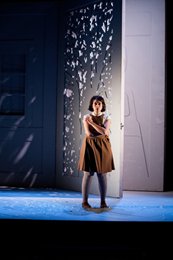Anne Frank (the subject of this opera) and Grigory Frid (the composer) have a lot in common. She, with her whole life ahead of her, is obliged to hide in a secret annex for two years; he, having studied composition intensively as a student, graduates from the Moscow Conservatory with gold medal in hand and his career as a musician about to take off, is obliged to join the army when the second World War breaks out. Like the heroine of this "mono-opera", as Frid calls it, he witnesses the horrors of war first hand. In his illuminating programme note for this production, the composer says: “Racism, Violence and anti-Semitism were not just bare words for me.” When he completed the work, latent anti-semitism in the late ‘60s further delayed the staging of the opera in continental Europe, so it's no surprise, perhaps, that this work is only now receiving its Irish and UK premiere.
All of the above was alluded to in the excellent short documentary screened after the opera (a Blackrock Pictures Production for Opera Theatre Company). It not only adds immeasurably to our understanding of the piece we have seen but helps us to empathise with its composer. (Indeed everyone I talked to at the end of the evening would have preferred to have seen the documentary first; I'm sure there's good technical reasons preventing this but maybe it could be posted on the OTC website?)
For this production, the taxing role which involves an hour long presence on stage is in the capable hands of Ani Maldjian, who has performed the role extensively in her native US. Frid's angular melodic lines with sudden leaps were well embedded in Maldjian's voice with a sureness of touch that made each phrase seem effortless. She matched this with a wide range of emotions - from the dread of what will happen if the annex is discovered, to the sexual awakening she experiences as she falls in love with Peter, a fellow occupant. Frid also requires his soloist to voice other people in the annex, such as the squabbling of the parents of the other family, and again Maldjian delivered the goods.
The only shortcoming here was the difficult feat of portraying a thirteen year old at the portal of life. Even allowing for an opera audience's almost super-suspension of disbelief (consumptive Mimis in rude good health, corpulent dashing heroes), an adult playing this particular thirteen year old is a tall order. Perhaps a different type of voice, without the standard vibrato might have been the key to this dichotomy. Unfortunately putting Ani Maldjian into an oversized school uniform and later a skirt and blouse just seemed to emphasise the obvious differences in age between performer and character – which was a pity, given such a strong overall vision.
 In fact, design-wise this was a triumph of set (Nicky Shaw) and lighting (Tina MacHugh) combining to deliver a truly imaginative response to the work. Confinement and concealment seemed to be the dominating motifs. A giant diary sounds like a terrible old cliché until you see this one, some twelve to fourteen feet tall - starting with its closed grey cover, like an unmarked tombstone. Our heroine turns the grey pages to reveal a stencilled annex window from which she views the world, which in turn looks out on to a chestnut tree – her only contact with nature during her two year confinement. The floorboards have secret trapdoors for radios, and cardboard cut-outs pop up from nowhere to evoke other people in the story.
In fact, design-wise this was a triumph of set (Nicky Shaw) and lighting (Tina MacHugh) combining to deliver a truly imaginative response to the work. Confinement and concealment seemed to be the dominating motifs. A giant diary sounds like a terrible old cliché until you see this one, some twelve to fourteen feet tall - starting with its closed grey cover, like an unmarked tombstone. Our heroine turns the grey pages to reveal a stencilled annex window from which she views the world, which in turn looks out on to a chestnut tree – her only contact with nature during her two year confinement. The floorboards have secret trapdoors for radios, and cardboard cut-outs pop up from nowhere to evoke other people in the story.
Usually when OTC does something from the standard repertoire we have a condensed orchestral score and no matter how artfully created, it can't ever be the composer's original intentions. The fact that this score for nine musicians under the capable direction of Andrew Synnott was actually penned by the composer adds immeasurably to the overall effect. The range of orchestral colour gleaned from such a small ensemble combined with the solo voice was breathtaking. The composer conveys Anne Frank's torments, fantasies fears and longings by a battery of scintillating effects – glockenspiel and piccolo, cello and clarinet, with menacing bassoon and piano for the ever-present danger of discovery and betrayal.
As this is OTC's last production, let's hope that their successors will continue in the tradition of their innovative productions, touring and outreach.
John White is a Drama Workshop Facilitator and Theatre Director.